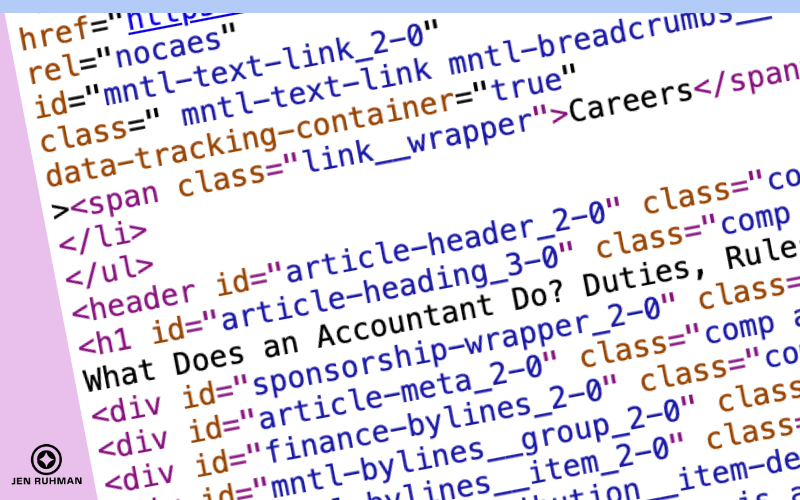When it comes to SEO, understanding the significance of H1 tags is crucial. H1 tags are an integral part of HTML that helps to give structure to web content. They play a pivotal role in optimizing a website for search engines and enhancing the user experience. In this comprehensive guide, we will delve into what H1 tags are, their importance in SEO, and how you can use them effectively.

What Are H1 Tags?
H1 tags are HTML elements used to define the main heading of a page. They are the largest and most significant heading on a page, usually appearing at the top. The ‘H’ in H1 stands for ‘heading,’ and the ‘1’ signifies its level of importance. In HTML, headings range from H1 to H6, with H1 being the highest and H6 the lowest.

Here’s a screenshot of this article’s H1 tag
The Role of H1 Tags in HTML Structure
The primary purpose of H1 tags is to provide a clear and concise summary of the page’s content. They help to organize and structure the content, making it easier for users to read and navigate. H1 tags also play a crucial role in assisting screen readers, aiding visually impaired users in understanding the structure of a webpage.
Why Are H1 Tags Important for SEO?
Search engines use H1 tags to understand the main topic of a page. They are a critical factor in on-page SEO, as they help to signal to search engines what the page is about. Properly optimized H1 tags can contribute significantly to a website’s visibility on search engine result pages (SERPs).
The Impact of H1 Tags on SERPs
When a user performs a search, search engines crawl through webpages to find relevant content. H1 tags serve as a guide, helping search engines to quickly identify the main topic of a page. This, in turn, increases the likelihood of the page ranking higher in SERPs for relevant queries.
H1 Tags and User Experience
Apart from their role in SEO, H1 tags also contribute to a better user experience. A clear and descriptive H1 tag helps users to quickly understand what the page is about, reducing bounce rates and encouraging longer page visits.
Best Practices for Using H1 Tags
Optimizing H1 tags is not just about pleasing search engines; it’s also about enhancing the user experience. Here are some best practices to follow:
Keep It Short and Sweet
Aim for brevity and clarity in your H1 tags. Keep them short, concise, and to the point, ensuring they accurately reflect the content of the page.
Include Relevant Keywords
Incorporate relevant keywords into your H1 tags. This helps to boost your SEO and ensures that your content is easily discoverable by users searching for related topics.
Use Only One H1 Tag Per Page
While it’s technically possible to use multiple H1 tags on a page, it’s best practice to use just one. This helps to maintain a clear and hierarchical structure, ensuring that your main topic stands out.
How to Effectively Use H1 Tags
Using H1 tags effectively is about striking the right balance between SEO optimization and user readability. Here’s how you can do it:
Align H1 Tags with the Page Title
Ensure that your H1 tag aligns closely with the page title. This consistency helps to reinforce the topic and provides a clear and coherent experience for the user.
Be Descriptive and Engaging
Your H1 tag should be descriptive and engaging, compelling users to read on. Use active language and consider the user’s intent when crafting your H1 tag.
Ensure Mobile-Friendliness
With the increasing prevalence of mobile browsing, ensuring that your H1 tags are mobile-friendly is essential. They should be easily readable on smaller screens, contributing to a seamless mobile experience.
Conclusion
Understanding and utilizing H1 tags effectively is a crucial aspect of SEO. They play a significant role in helping search engines understand the main topic of a page, contributing to higher rankings in SERPs. Additionally, well-optimized H1 tags enhance the user experience, encouraging longer visits and reducing bounce rates. By following best practices and ensuring your H1 tags are descriptive, engaging, and SEO-friendly, you are setting the stage for SEO success.
FAQs
Q1: Can I use multiple H1 tags on a single page? While it’s possible to use multiple H1 tags on a page, it’s generally recommended to use just one to maintain a clear and hierarchical structure.
Q2: Do H1 tags directly impact my website’s SEO? Yes, H1 tags play a crucial role in SEO. They help search engines understand the main topic of a page, contributing to higher rankings in SERPs.
Q3: Should I include keywords in my H1 tags? Absolutely, incorporating relevant keywords into your H1 tags can significantly boost your SEO and make your content more discoverable.
Q4: How long should my H1 tag be? Aim to keep your H1 tag short, concise, and to the point, ensuring it accurately reflects the content of the page.
Q5: How do H1 tags contribute to the user experience? H1 tags enhance the user experience by providing a clear and concise summary of the page’s content, making it easier for users to read and navigate.
Unlock the Full Potential of Your Online Presence: Exceptional SEO Services in San Diego Await!
If you’re aiming to make your website super popular and fill it with loads of visitors, you’ve got to check out our amazing SEO services in San Diego! We’re really good at turning websites into total traffic magnets, ensuring that more people can find and visit your site. Give us a call or send a text to (619) 719-1315, and let’s get started on boosting your site’s visibility together! Trust us, when it comes to being an SEO expert in San Diego, we totally rock at it. So, don’t miss out! If you want more people visiting your website, reach out and hire us today. You can call or text us at (619) 719-1315. Let’s make your website the cool place to be online!

